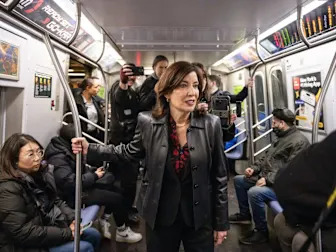(Bloomberg) -- Transportation projects in Manhattan may be at risk of losing federal approval or funds after New York Governor Kathy Hochul rejected the Trump administration’s demand to end congestion pricing.
US Secretary of Transportation Sean Duffy may begin withholding authorizations and federal money as soon as May 28. Last month he gave New York officials until May 21 to stop charging motorists a fee to drive into parts of Manhattan or explain how the program is legal.
Hochul and officials at the Metropolitan Transportation Authority, a state agency that is implementing the toll, have said congestion pricing is reducing traffic and raising needed revenue, and that it will continue until a court orders it to end.
The tolling initiative is authorized under the federal value pricing pilot program and Duffy doesn’t have the authority to terminate it, Roberta Kaplan, a lawyer for the MTA, wrote in a May 21 letter to the Federal Highway Administration. Making threats to get Hochul and the MTA, which runs New York City’s transit network, to end the toll “is unlawful,” Kaplan wrote.
“Withholding of federal funds is unconstitutionally coercive,” Kaplan added.
Duffy’s threats put at risk $2.2 billion of MTA projects for subway and bus maintenance, as well as railroad track work the state recently submitted for federal approval, according to court documents that are part of a lawsuit the MTA filed in February against Duffy that seeks to uphold congestion pricing. New York City relies on an average $250 million of federal cash each year for transportation needs.
Projects in jeopardy include a $545 million initiative to reconstruct a movable bridge in the Bronx, which depends on $130 million of federal money, and a $470 million Trans Manhattan Expressway project to upgrade 80-year-old ramps, which awaits federal review and potentially $98 million in US funding, according to court documents.
“US DOT has threatened to start withholding transportation funding from New York State based on wrong-headed and baseless arguments that, in fact, would only hurt the working New Yorkers they purport to help,” Lisa Daglian, executive director of the Permanent Citizens Advisory Committee to the MTA, said in a statement.
New York State Attorney General Letitia James’s office also sent a letter dated May 21 to the FHWA on behalf of the state’s Department of Transportation in support of the congestion-pricing plan.
In a statement Thursday, a spokesperson for Duffy said the department “will be reviewing New York’s response to determine if they remain in compliance.”
About 8.1 million fewer vehicles entered Manhattan’s central business district since Jan. 5, when the toll began, through April, for a daily average decline of 11%, according to MTA data. Most motorists pay $9 during peak hours to drive south of 60th Street in Manhattan.
The toll brought in $159 million in the first three months of the program and is on target to raise $500 million this year after expenses, according to MTA officials. The MTA anticipates borrowing against the revenue collections to finance $15 billion of transit upgrades that will modernize a more than 100-year-old system.
Duffy notified the MTA in February that he was reversing federal approval of the congestion pricing initiative, the first of its kind in the US, saying the program doesn’t offer a non-tolled alternative and that revenue only goes to transit infrastructure. The MTA quickly filed suit to nullify Duffy’s actions.
The transit agency earlier this month filed a preliminary injunction to stop Duffy from threatening to withhold approvals and funding. The judge in the case may hold a hearing on that preliminary injunction on Tuesday.
(Adds comment in eighth paragraph and DOT statement in 10th.)


